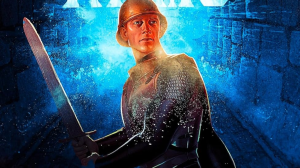When Watchmen premieres next month the HBO series give fans a look at a world that is in many ways very different from our own. Robert Redford will have been president for the last 28 years. The police wear identity-concealing masks. Cell phones and the internet are outlawed. These are not insignificant differences, but even with Watchmen alternate reality being quite different from our own it will still share some of the same real-world issues we do. It will just have a very specific approach, one that allows viewers to decide for themselves their meaning.
Videos by ComicBook.com
In a recent interview with Entertainment Weekly, series creator Damon Lindelof admitted that show will avoid moralizing when it comes to hot button topics and that while the approach is one that freaks him out a bit, it’s meant to create conversation.
“The read is completely accurate and yeah it freaks me out,” Lindelof said when asked about the approach. “But when I’m freaked out is when I get excited. I can’t write or create from a nervous scared space. If you stop and try to talk yourself out of doing something that might be upsetting or might make people onerous or confused or uncomfortable, you’re never going to do anything interesting. You have to jump in with some degree of forethought and responsibility and then afterward you can ask yourself why you did it. The time for contemplation is not at the edge of the diving board because going back down the ladder is worse than the distance to the pool. I also kind of feel like, unfortunately, we live in a space where hate runs rampant not just on the internet but in real life and it’s important to remind ourselves this is a TV show. It is not real. Although it is dealing with real issues and it’s meant to generate and provoke conversations and emotions, we have to contextualize that this is fiction.”
One of the hot-button issues that Watchmen will take on is the racial divide in the United States. In Watchmen reparations — a form of compensatory payment to the descendants of slaves — is a reality, though it goes beyond slavery to all racial violence and has had some unexpected consequences.
“We’re living in a world where fossil fuels have been eliminated as a power source,” Lindelof said. “All the cars are zero emissions and run on electricity or fuel cells — largely thanks to the innovations of Dr. Manhattan decades earlier. There’s also this legislation that’s passed, Victims OF Racial Violence Legislation, which is a form of reparations that are colloquially known as “Redford-ations.” It’s a lifetime tax exemption for victims of, and the direct descendants of, designated areas of racial injustice throughout America’s history, the most important of which, as it relates to our show, is the Tulsa massacre of 1921.”
He added, “That legislation had a ripple effect into another piece of legalization, DoPA, the Defense of Police Act, which allows police to hide their face behind masks because they were being targeted by terrorist organizations for protecting the victims of the initial act. So … good luck sound biting that!”
Ultimately, those masks end up offering even more themes for the series to explore.
“So I felt like we wouldn’t be deconstructing the superhero myth because all the characters in Watchmen are just humans who play dress up,” he said. “It would be more interesting to ask psychological questions about why do people dress up, why is hiding their identity a good idea, and there are interesting themes to explore here when your mask both hides you and shows you at the same time — because your mask is actually a reflection in yourself.”
Watchmen debuts on HBO on October 20th.








